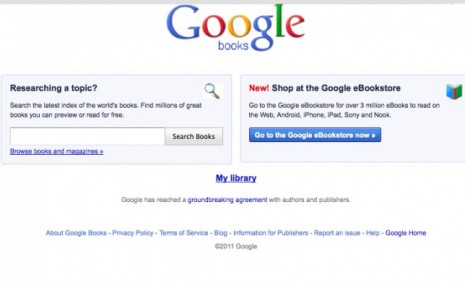Google Books: Shelved for good?
A judge rejects Google's settlement with authors and publishers. Is this the end of the search giant's plan to digitize all the world's books?

A free daily email with the biggest news stories of the day – and the best features from TheWeek.com
You are now subscribed
Your newsletter sign-up was successful
Google's ambitious plan to digitize every book ever published was thrown into "legal limbo" this week, when a federal judge rejected a $125 million settlement the company had made with authors and publishers. Judge Denny Chin said the plan would give the company a "de facto monopoly" and allow it, in some cases, to profit from books without the permission of their authors. Is this the end of the road for what would have been the world's largest digital library and bookstore? (Watch a report about the decision)
Yes, and good riddance: Chin's message is "blunt" and "scathing," says Nicholas Carr at Rough Type. Google's "scanner-in-chief" — co-founder and soon-to-be CEO Larry Page — will not be allowed to "unilaterally rewrite copyright rules," and steal the work of authors. Let's hope Page learns something from this, and comes up with a plan that respects everyone's intellectual property rights.
The Week
Escape your echo chamber. Get the facts behind the news, plus analysis from multiple perspectives.

Sign up for The Week's Free Newsletters
From our morning news briefing to a weekly Good News Newsletter, get the best of The Week delivered directly to your inbox.
From our morning news briefing to a weekly Good News Newsletter, get the best of The Week delivered directly to your inbox.
Google can still revive the dream: Google Books is dead... but only for now, says David Post at The Volokh Conspiracy. "The project would be an incomprehensibly valuable boon to all of humankind," so it's worth reviving. Since most of the publishing industry sided with Google, it's only books published in the '30s, '40s, and '50s, whose copyright holders can't be found, that are a real sticking point. Congress could fix that, though, by changing the applicable laws to make these books available to Google, or anyone else willing to give them new life.
And a virtual library is a good idea: Yes, no single company should be able to monopolize "access to our common cultural heritage," says Robert Darnton in The New York Times. But "we should not abandon Google's dream of making all the books in the world available to everyone." There must be ways to surmount the "legal, financial, technological," and political obstacles, and create a comprehensive digital library that truly is public.
"A digital library better than Google's"
A free daily email with the biggest news stories of the day – and the best features from TheWeek.com
-
 Will increasing tensions with Iran boil over into war?
Will increasing tensions with Iran boil over into war?Today’s Big Question President Donald Trump has recently been threatening the country
-
 Corruption: The spy sheikh and the president
Corruption: The spy sheikh and the presidentFeature Trump is at the center of another scandal
-
 Putin’s shadow war
Putin’s shadow warFeature The Kremlin is waging a campaign of sabotage and subversion against Ukraine’s allies in the West